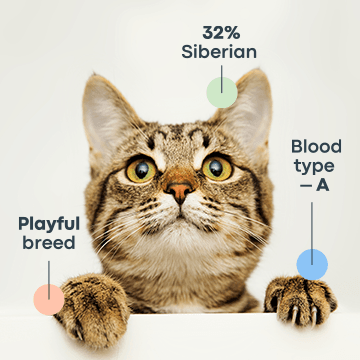Could it be that a cat's actions are the window to their soul? Just like their human counterparts, cats show trust based on their actions. If they’re pawing you to get away from them, the human-cat trust bond is not well-developed yet. Building a bond with your cat can take time and patience.
Identifying your cat's pawsitive behaviors will show you whether you need to cultivate a stronger cat-human bond.
How Trust Affects the Cat-Human-Bond
When your cat trusts you, it’s a sign that you have a strong bond. The stronger the bond you have with your cat, the more mutual benefits you receive, including:
Lower stress and anxiety
Diminished feelings of loneliness
Improved cardiovascular health
Signs Your Cat Trusts You

So, how can you tell your cat trusts you? There are varying degrees of trust, so you may notice your cat expressing some or all of these. If your cat is new to your home, they may not show any of these signs, yet, but be patient. Trust takes time to build.
1. Vocalizations/Bunting
Cats can show affection by bunting. When they rub their scent glands against your ankles and hands, it’s a surefire way to indicate that they like you. Purring and other vocalizations also show that they trust you and your presence. Cats vocalize to communicate with you. Listening to your cat allows you to distinguish what they need.
Cats save their standoff-ish and reserved behavior for guests. Holding out a hand shows that they can get your scent, without the interference of touching. As they get adjusted to a new presence, they’ll start to bunt and vocalize their feelings of contentment. Evasive behavior and hiding indicate that they need more time. Treats/toys/catnip will help cats become comfortable.
2. Roll Over to Show the Belly
In nature, cats are both prey and predator to small critters. Evolutionarily, as prey, they learned to protect themselves and their vital organs (such as the belly area) from those they mistrust. If your cat is still very protective of their belly and chest, building confidence in you will help them feel more vulnerable and safe.
Is your cat rolling on their back to show their belly? That’s a wonderful sign of cultivating trust! However, revealing their tummy doesn’t indicate they feel safe with someone touching it. Many cats still feel uncomfortable with human or animal contact on their chest or belly region.
Continue a trusting/bonding relationship with your kitty by respecting their comfort level. Most cats will continue to shy away from belly touches and that’s okay. Rubbing their cheeks and showing other signs of affection, demonstrate your continued bond with your cat.
3. Grooming
Cats are fastidious groomers. Sometimes they groom each other and they often lick themselves with their coarse tongues. Your cat may occasionally lick you too. If they do, be wary of open wounds.
They have papillae on their tongue, which help remove dirt, loose hair, and apply saliva to keep them cool. Despite their best efforts, cats sometimes need help with grooming, such as combing their fur, cleaning their ears, and brushing their teeth. To ensure they stay healthy, building a trusting relationship with your cat is a priority for successful grooming.
Reasons your cat needs assistance grooming:
Long hair
Aging cats/unable to reach behind them
Recovering from a surgery
Arthritis
Tummy sickness/messy poops
Cats that allow you to groom them is a major sign of trust. Using a brush on your cat can feel bizarre to them. With an abundance of trust and developing that bond, your cat can get the care from you that they need.
4. Let You Scoop Them Up & Feel Relaxed
When your cat allows you to pick them up and their body is relaxed, it means that they have absolute trust in you. Sometimes owners hold their cat cradled like a baby or they hold their relaxed cat on their shoulder.
If you choose to lift them, there are signs your kitty is not relaxed. If your cat extends their claws or if their body is tensed up as you lift them, then your cat is not ready to be held.
Building a bonding relationship takes practice. One of the best ways you can build trust is by responding to their body language. Holding a cat with negative body language is the quickest way to deploy their distrust. As soon as they look uncomfortable, put your cat back on the ground. If they respond well to your touch, reward them with a treat.
5. Bring You Presents
Cats are hunters and they demonstrate trust by bringing your gifts! If you have an outdoor cat, you may see “presents” on your doorstep. Seeing a piece of a lizard or rodent or bird shouldn’t alarm you. It means that your cat honors and loves you. Saving a piece of their meal/hunt for you indicates an overabundance of trust in their human, despite the shock it may give you in the morning.
If you have an indoor kitty, they may lay toys near you to indicate the same trust. If their favorite catnip toy is always left beside you after a nap, know that your cat adores you and has no problem showing it. Just as humans give gifts when they have a strong bond with someone, cats have the same tendency to show appreciation.
Ways you can build trust with your cat

As you likely know, no two cats are the same. Some cats take a bit longer to warm up and build trust, especially if they came from a tough background. However, you can take deliberate steps to build trust with your cat. Here are some ways to grow the trusting bond with your cat:
Don’t touch their stomach as soon as they show it
Let them find you/respect their space
Touch them gently
Don’t touch their belly when they’re bunting
Be their source of consistent food
Trust Your Cat & Their Body Language
Cats can be irritable too. If they once let you pet their belly, but now they won’t, put a pause on your touches. Cats are very vocal and responsive creatures. Hair raising behavior shows that your cat needs space. Showing compassion for their space will go a long way in your bond-forming relationship.
And if your cat is happy and content, you will be too!





